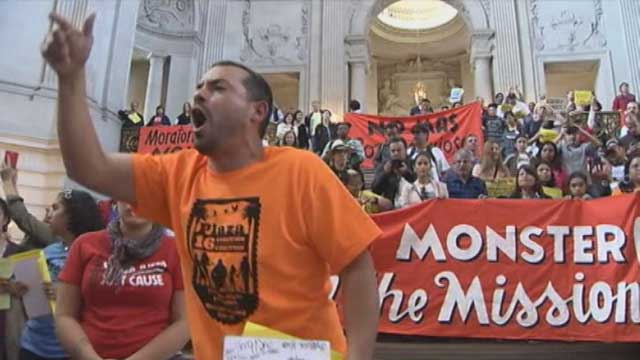Evictions Fuel Bay Area Housing Crisis
May 10, 2015
Posted in Gentrification, Housing/Foreclosures

By Nikolas Zelinski
San Francisco’s eviction rate has increased by over 54 percent in the past five years and is currently at the highest rate within the last decade, according to a new report produced by the San Francisco Anti-Displacement Coalition.
These evictions are occurring in the midst of a housing crisis, in which rent prices have dramatically increased. In the last year alone, rents in San Francisco have risen by 12.8 percent, and by 10.5 percent in Oakland, according to a report from Forbes.
The combined impacts of higher eviction rates and rental prices have led to a wave of displacements. To make matters worse, changes that occur in the San Francisco housing and rental market create a “ripple” throughout the Bay region, explained Sara Shortt, executive director of the Housing Rights Committee.
“The entire Bay Area is struggling with eviction problems,” she said. “As tenants from San Francisco become evicted and displaced, they often wind up in Oakland. And that raises Oakland’s rent, which continues the cycle.”
Another part of the problem is that, “Many tenants self-evict; it’s a term we use to describe a tenant who flees from fear, not allowing the court process to play out,” said Shortt. “They get a notice, and they pack up and move. In that sense, they have not been formally evicted.
Shortt continued, “An eviction notice is not the same as an eviction. You actually have to go to court, and get a judgement. In many of these cases, we believe that renters would have been able to stay.”
“Most importantly what we need to do is deter speculation, that’s the root of many of these evictions,” she said. “There are a number of tools that we can use locally to remove profits from the process.”
“We had Proposition G in 2014 that would have set taxes for any profits made from evictions. Unfortunately it did not pass, but that kind of idea still needs to be implemented,” Shortt said.
During the campaign, the National Association of Realtors contributed $800,000 to fight against Prop G. The California Association of Realtors donated $425,000, and the San Francisco Association of Realtors devoted $170,000.
“Essentially, one of the biggest parts of the problem is property flipping. So anything that would remove the huge amounts of gain from buying a property and reselling it quickly would help curb evictions,” Shortt said.
Many evictions in the City fall under the Ellis Act, which was passed in 1985. The law was originally designed to provide landlords and property owners an easy way out of the rental business.
According to Shortt, the system has now become corrupted and strayed from its original intent, and mostly utilized by property speculators.
She concluded by saying the report released by the Anti-Displacement Coalition was intended to inform renters about possible recourse when facing an eviction, emphasizing that people who receive eviction notices should seek local housing rights agencies for help and legal advice.